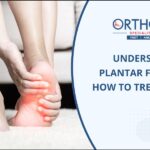
Arthritis Foot Pain
Arthritis is a common chronic condition suffered by people, especially as they age. Arthritis often refers to the inflammation of joints, usually caused by overuse. The deterioration of the bone joints occur when the cartilage wears away and causes the bones to cause friction against each other. This causes pain and decreases movement of the joints. As a result, especially as people age, arthritis can inhibit the activities of daily living.
Feet and ankles, which comprise of 30 joints and 28 bones, are very susceptible to arthritis. Osteoarthritis, which is the most common form of arthritis, affects almost everyone during middle age. Arthritic pain can range from moderate to severe, and can also leave someone completely immobile due to its severity.
Arthritis management and foot care
Arthritis cannot be completely cured, but the progression of the damage and the immobility can be controlled by taking certain steps:
- Maintaining healthy weight that causes minimal pressure to the foot joints
- Reducing activities that have a high impact on feet and ankles (e.g. running)
- Wearing customised shoes and insoles that take the pressure off the joints and provide relief while walking; also minimises pressure and friction.
- Consulting a physiotherapist who can recommend certain exercises meant to retain motion and flexibility in the foot joints.
- Wearing a brace or using a walker or a cane. Walking with an orthopaedic aid assists in taking the pressure off the joints in the ankle and feet.
- Having anti-inflammatory medication as prescribed by the doctor that provides temporary relief.
How different kinds of Arthritis hurt your feet
Various types of arthritis present differently in the feet.
- Osteoarthritis most commonly affects the first metatarsophalangeal joint (MTP) that connects your big toe to your foot, although it’s also often found in the midfoot and ankle.
- Rheumatoid arthritis usually appears in both feet and affects the same joints in each foot. This is in contrast to OA, which typically affects one specific joint.
- Gout frequently affects only the feet, often the big toe.
- Psoriatic arthritis (PsA) can also take a toll on toes, causing sausage-like swelling called dactylitis. PsA is often also accompanied by inflammation of the entheses, the places where tendons and ligaments attach to bones. In the feet this usually presents as plantar fasciitis, an inflammation of the band of tissue that connects the heel bone to the toes, as well as the bony projections known as bone spurs, which can cause pain if they press or rub on other bones or soft tissues.
- Ankylosing spondylitis also causes enthesitis, such as plantar fasciitis and pain at the Achilles tendon.
Causes
- Achilles tendinopathy
- Broken foot
- Gout
- Septic arthritis
- Plantar fasciitis
- Tendinitis
Symptoms
- Trouble moving, walking, or putting weight on it
- More pain and swelling after you rest, such as sitting or sleeping
- Pain when you move it
- Pain or stiffness in the toe joints or in the joints and ligaments throughout the foot
Treatment
- Pads or arch supports in your shoes
- Physical therapy
- Pain relievers
- Anti-inflammatory drugs to help with swelling
- Custom-fitted shoes
FAQ
What is arthritis?
What causes arthritis?
Am I at risk for arthritis?
Foot and Ankle
Opening Hours
| Monday – Friday | 8.00 – 18.00 |
| Saturday | 9.00 – 17.00 |
| Sunday | 9.00 – 15.00 |
| Holidays | Closed |
Book Appointment
[rt_cf7_style submit_background_color=”#14a09d” submit_hover_color=”#14a09d” submit_text_color=”#ffffff” submit_text_hover_color=”#ffffff” radiant_submit_border_style=”solid” radiant_submit_border_color=”#14a09d” radiant_submit_border_top=”1px” radiant_submit_border_right=”1px” radiant_submit_border_bottom=”1px” radiant_submit_border_left=”1px” radiant_font_color=”#5e5e5e” padding_right=”15px” padding_left=”10px” radiant_border_style=”solid” radiant_border_color=”#d8d8d8″ radiant_border_top=”1px” radiant_border_right=”1px” radiant_border_bottom=”1px” radiant_border_left=”1px” radiant_background_focus_color=”#ffffff” radiant_focus_style=”solid” radiant_focus_color=”#14a09d” radiant_focus_top=”1px” radiant_focus_right=”1px” radiant_focus_bottom=”1px” radiant_focus_left=”4px”][contact-form-7 id=”8006″][/rt_cf7_style]Quick Contact
- Address PO Box 16122 Collins Street West Victoria 8007 Australia
- Email info@example.com
- Phone 888-123-4567 / 888-321-7654
Choose Your Hospital, Choose The Best Care For Yourself.




